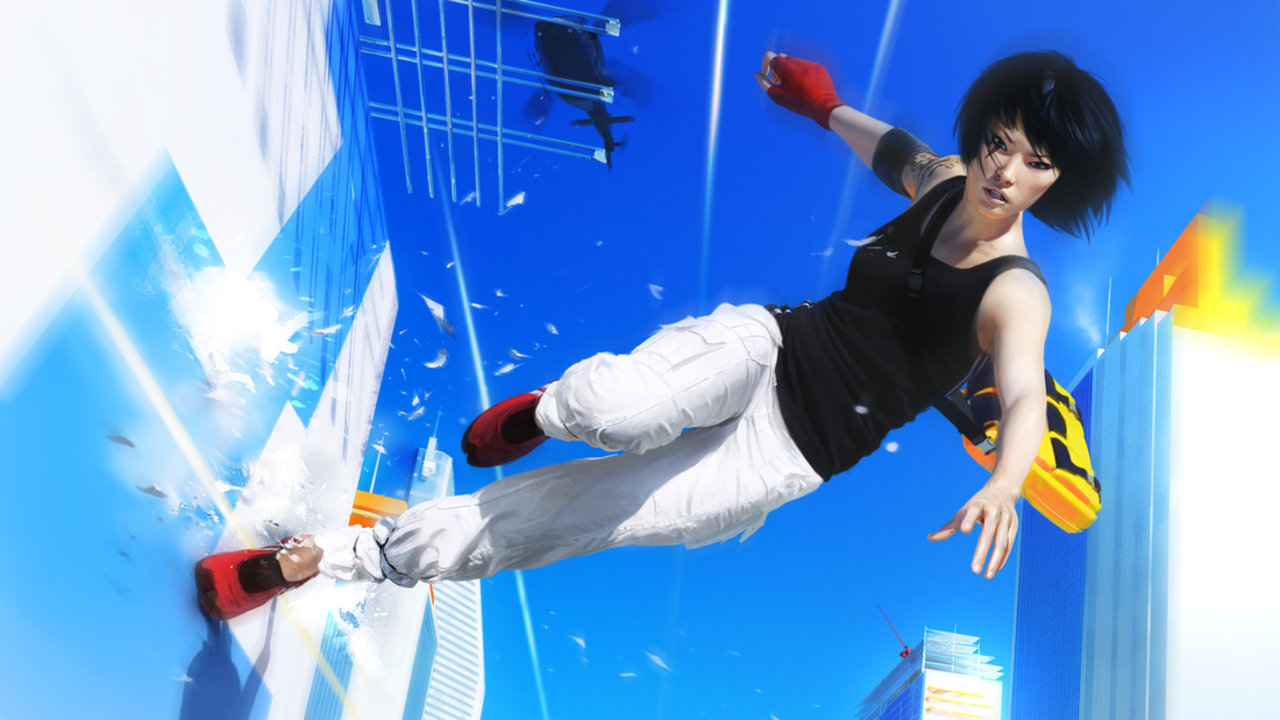Mirror’s Edge is often remembered for one of three things - being experimental, being better than many gave it credit for at the time of its release, and for its incredible aesthetics. While many fans cried out for a sequel for years since the original was released onto store shelves, EA remained incredibly coy about its future plans for the series. Until last year’s E3, where the announcement of a long-awaited sequel was met with jubilant cheers from the assembled audience.
This year’s E3 is now just a few weeks away, and it’s highly likely that Electronic Arts will reveal more about DICE’s return to the sterile, yet aesthetically pleasing, universe of Mirror’s Edge. So what better time is there to take a look back and refresh our memory of the original?
Mirror’s Edge is a game about a Runner named Faith. Runners are experts in parkour, or free running - or whatever the cool kids are calling it these days. Runners are also couriers. In a world where everything is monitored - and the government is quite particular about transgressors - these couriers of undocumented information are not exactly on friendly terms with the police. In the opening sequence, Faith takes a particularly nasty fall which puts her out of action. As such, you are forced to relearn all of Faith’s old tricks in the tuturial, in order to get back to her underground/overground work.
You quickly learn that Faith’s sister is a cop, and is being framed for murder. At the same time, someone else lifted evidence from a crime scene, and framed Faith’s sister in the process. All of this happens for reasons that are never really explained: the game doesn’t perform a great job of conveying its story, and what is there is largely forgettable. Faith needs to run around the city looking for leads that will help her sister clear her name and avoid going to jail, and along the way there’s a conspiracy waiting to be unraveled, a coverup waiting to be exposed, the inevitable betrayals, and all the other usual narrative contrivances thich tend to ruin a plot by bogging it down in cliche; unfortunately, the plot in Mirror’s Edge is both overly complicated and completely redundant at the same time. Mirror’s Edge plays a lot better when you ignore the plot completely, and play it purely as a free-running simulator.
While the free-running side of Mirror’s Edge is a lot of fun, it’s also almost entirely linear. You’re placed in a beautiful city and then told you can’t explore it, which in many ways feels like being stuck in the linear walkways of Bioshock‘s Rapture. It’s not quite as interesting as Irrational’s underwater dystopia, but there’s the same level of disappointment and frustration in being confined.
Most of the game is spent running, be it on rooftops or through buildings. But while the game relentlessly railroads you from one set-piece to another, it at least makes a concerted effort to look gorgeous while it does so. Make no mistake: the aesthetics in Mirror’s Edge are fantastic - moreso when you consider that the game was released in 2008. DICE may have made their name with Battlefield - a series dominated by drab greys and browns punctuated by flying debris and huge explosions - but Mirror’s Edge shows that they’re perfectly capable of operating outside the confines of the franchise with which they are most closely associated.
Gameplay takes place purely from a first-person perspective, looking over the city through Faith’s eyes. The city is immaculate, with crystal-clear visuals, motion blur in the corners of the screen when you sprint, and everything that you would expect from a game based on free-running. Like Assassin’s Creed which starts its free-running sequences by placing white sheets over the start point, Faith sees things in shades of real and red. Areas which you can climb, or that you are immediately about to climb onto are highlighted in red in order to make for a smoother running experience - and for the most part it does a pretty good job in this respect; the biggest problem here is that when you are running and jumping, you do not look at your feet. While it feels incredible being in Faith’s shoes, you cannot see where they are just before you screw up a jump. It’s perhaps why we don’t see more first-person platformers - they are hard as hell to pull off.
The second biggest problem is that the engine is buggy. Collision detection is awful; Faith will occasionally stop and press up against an object for no reason other than that the game engine doesn’t realize that you wish to climb the three-foot box in front of you. This breaks the fluidity of gameplay entirely, turning what should be a game focused on constant movement and the adrenaline rush that goes with frequently navigating high-rise scaffolds into a frustrating exercise of wrestling with a game engine that simply doesn’t want to recognize your inputs.
Likewise, you’ll often find that when trying to string together a chain of acrobatic maneuvers, Faith will accidentally jump from the skyscraper she is climbing into the yawning abyss beneath her, hundreds of meters below.
Bugs aside, the free-running is fun. Special attention must be given to safely land your jumps, falling from a certain height will hurt Faith if you don’t make her roll like a pro, and unlike Assassin’s Creed‘s hold-down-a-button-and-climb-anything approach, there’s a degree of skill required in being able to navigate your environment. The way Faith strings together her moves together, in what is effectively a free-running combo, is also very nicely done. What is poorly executed is the way in which DICE tries to fit this free-running mechanic into an actual game; the plot can be summed up in the 19 minutes of cutscene which the title has to offer, and it adds little to the experience beyond providing the player with some context for the action. It’s all fair and well that Faith is a total bad-ass, but the rest of the characters are bland and forgettable. To add insult to injury, the plot is best summed up by a quote by Claptrap from Poker Night 2: “[it’s] like watered down marinara - weak sauce.”
The problem with shoe-horning this mechanic into the plot is that the story not only fails to engage, but it gets in the way of the gameplay. Faith, as an activist in a city which seems to resemble a more sterile version of George Orwell’s 1984, is not well-liked by the police. She is often having run-ins with law enforcement officials, and considering that they have guns and Faith does not, these run-ins are often run-aways. Ideally, you are supposed to play Faith as a non-lethal character: while you can disarm the Blues in some truly spectacular ways and incapacitate them with Faith’s above-average martial arts, you can just as easily take their guns and shoot them in the face. You would expect that Faith, as a Runner, would run away at every available opportunity; instead you’ll often find that you need to proceed through a room of Blues, dispatching them one-by-one - lethally or non-lethally - before she can move on. This detracts from the whole experience; the Deus Ex franchise is well-loved for its ability to play equally well, whether lethally and non-lethally (aside from the unfortunate boss encounters seen in Human Revolution). Unfortunately, Mirror’s Edge doesn’t know what it wants to be, and spreads itself too thin between the running and combat, forcing Faith into combat more often than is truly necessary.
All in all, Mirror’s Edge isn’t a bad game. It has some gorgeous art design and it takes some brave risks by experimenting with ideas that many lesser developers would be ill-equipped to realize, let alone succeed with. It’s an experiment which takes a leap of faith (all puns intended) but doesn’t achieve a perfect landing. We applaud experimentation in games - and we’re looking forward to what the reboot has to offer. However, as fun as the game may be, there ‘s a lot of work to be done before DICE are finally able to shake off the mantle of being known as “that developer which makes Battlefield“.

